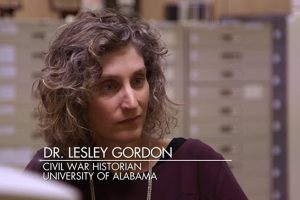
From the July 2017 Desktop News | “Who Do You Think You Are?” This is the question actor Noah Wyle, known for his role in “ER,” set out to answer with the help of Dr. Lesley J. Gordon, the Charles G. Summersell Chair of Southern History at UA. This popular television series follows celebrities as they search for information on their genealogical history.
During Wyle’s episode of “Who Do You Think You Are?,” which aired on TLC earlier this year, Gordon helped the actor solve a family mystery surrounding his ancestor John Henry Mills. According to Wyle’s uncle, Mills had paid someone to take his place during the Civil War, but Wyle was skeptical and hoped to find more proof.
Wyle initially discovered that Mills was born in New York but had relocated to Baton Rouge where he worked as a clerk by the time of the Civil War. Gordon explained to Wyle that in March 1862, Mills joined the New Orleans “Crescent Regiment.” This particular regiment, known as a “white glove” unit, consisted of educated young men from the city. Not long after Mills enlisted, his regiment saw action at one of the bloodiest battles of the Civil War: The Battle of Shiloh. Mills, apparently survived unscathed.
In preparation of the filming, Gordon reviewed the history of the battle—despite already knowing it fairly well—before meeting with Wyle in hopes of being able to answer any questions he might raise about his ancestor.
“Noah was great,” Gordon said. “The show’s producers told me he was a Civil War buff and that he was fascinated with its history. He asked lots of questions and spent breaks looking through books in the Civil War section of the State Archives.”
This isn’t the first time Gordon has had an opportunity to appear on television. Prior to this experience, she was featured on and episode of PBS’s “American Experience,” and she has appeared multiple times on C-SPAN giving various lectures.
“These kinds of opportunities allow academics like myself to have a more public forum to talk about what we actually do as historians, and make it relevant to people’s lives,” Gordon said. “This show in particular demonstrates how multifaceted history is as a profession by including archivists, genealogists, as well as academics, and they often film on site, in archives, on battlefields and other historic locations. Besides showing someone’s interest in their personal history, the show tries to delve into broader historical themes as well.”